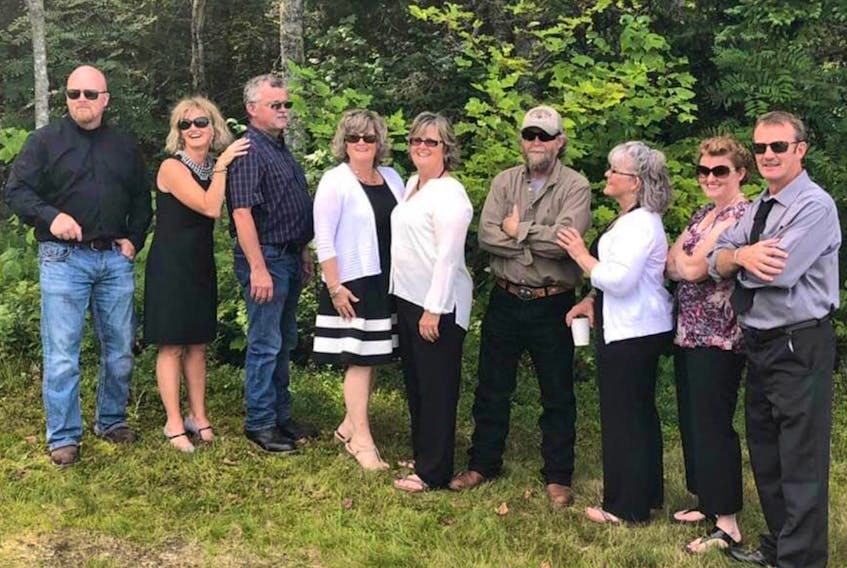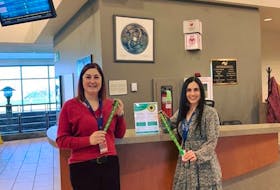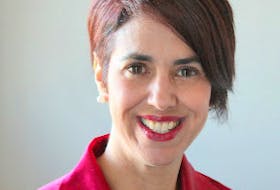RIVER DENYS – About a dozen years ago while at work, Malcolm MacDonald took a hot spark to the area directly around his eye.
“It was a hot coal,” the 58-year-old River Denys forestry worker said. “It went right into my eye. I thought I could fix it myself. I put everything on it. It would heal up and then it would go haywire.”
“I knew there was something wrong. My family’s been telling me for 10 or 12 years to get it looked at. I was always healthy, I was never sick.”
Finally, last year MacDonald underwent a biopsy and CT scan and was told that he had skin cancer. What followed was four specialists telling him that he would likely have to have his eye removed in order to treat the cancer.
Losing his eye would have had a huge impact on MacDonald’s day-to-day and working life.
“I drive big trucks. It’s my right eye, the left eye is a little weaker than the right eye.”

However, a plastic surgeon who was working on MacDonald’s case happened to mention it to a colleague, coincidentally, another native Cape Bretoner – Dr. Carmen Giacamantonio, who hails from Whitney Pier and works at Dalhousie University in Halifax.
“He saw it and said he wanted to help me … They were all ready to take my eye out,” MacDonald said.
Since embarking on this path in his career, Giacamantonio says he has recognized the work done by other scientists that infection influences the trajectory of cancer. His first paper on this subject was published in 2004.
“But at the time, we really didn’t know what to do with that information,” Giacamantonio said.
Interleuken 2 stimulates cancer-fighting T cells but was being administered intravenously and proved to be prohibitively toxic. Some scientists started looking at injecting small doses of it directly to a cancer.
“This was all a melanomas, and I branched out into other cancers,” Giacamantonio said. “One of the first early successes that we had here was squamous cell cancers and that’s what (MacDonald) had.”
He said the therapy recognizes that if the immune system is activated in the context of the cancer, it will sometimes attack the cancer.
Giacamantonio said the risk in this approach is that if it doesn’t work, the cancer progresses but that wasn’t the case with MacDonald.
“There’s needles, all the needles are underneath the eye,” MacDonald said.
His treatment started Dec. 18 and his last treatment was about two months ago. About three weeks ago during a visit to Giacamantonio in Halifax, MacDonald was told there was no sign of cancer.
Giacamantonio, who has been a surgical oncologist for more than 20 years, said it’s rare for something to come along that revolutionizes what you do.
“Surgeons, we like to cut things out and no doubt that’s very effective, but sometimes it comes at a big price,” he said.
“It’s so satisfying. It’s the thing that motivates me now more than anything is my research and these outcomes … I literally said it 15 years ago, immunotherapy will change the cancer world.”
Admittedly someone who keeps to himself, MacDonald normally wouldn’t be one to come forward and share his story. But he believes it’s important the people hear about his experience.
“I want to help Dr. Carmen and help somebody else,” MacDonald said. “I’m a pretty quiet person but if it helps this doctor or anybody out there you gotta do a little extra, that’s for sure.
“It’s been great dealing with Dr. Carmen from the first time I met him. I’m very lucky that I got to see him. You’re dealing with an expert.”
MacDonald says this has been a life-changing experience for him.
“I’m trying to be a better person. I never wanted to hear too much about cancer. I know it’s bad, but it kind of hits you in the face.”
Run by the Dalhousie Medical Research Foundation, the Molly Appeal for medical research is a grassroots initiative that has supported medical research in the Maritimes every year, for the past 40 years.
This fall’s Molly Appeal aims to raise public funding for critical health research at Dalhousie University that has taken a backseat during the COVID-19 pandemic — research in other important areas including cancer, cardiac care and dementia.
Those interested in local, life-saving medical research can learn more about this year's Molly Appeal at MollyAppeal.ca.









